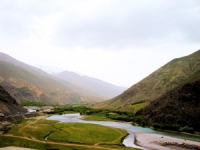Water sharing between Central Asian countries has been conflicting for quite a long time already.
Environmental Performance Review of Turkmenistan

The Environmental Performance Review of Turkmenistan, performed by the United Nations Economic Commission for Europe (UNECE), takes stock of progress made by Turkmenistan since 2000 in 13 areas of importance to the country related to environmental policy making, implementation and financing, climate change, water, air quality, waste, energy, biodiversity conservation, forestry, land management and cooperation with other countries on the environment. While necessary actions were taken to address environmental issues, some challenges remain: the salinization of irrigated lands, desertification and biodiversity loss remain the most pressing challenges for Turkmenistan according to the review published this week.
Turkmenistan has experienced sustained economic growth over the past decade, mainly owing to the production and export of hydrocarbons, especially natural gas. According to official statistics, real gross domestic product rose at an average annual rate of nearly 13% during 2000–2010, and average real per capita income has tripled over this period to reach USD 6,611.
Turkmenistan started developing its environment-related strategies and programmes in early 2000. Priority areas of the State policy are protection of atmospheric air, development of “green belts”, protection of water, land and forest resources, and conservation of biodiversity. Turkmenistan is currently party to 11 international environmental treaties and is making efforts to bring its legislation in line with its international obligations. Among the recent achievements is the accession by Turkmenistan to the UNECE Convention on the Protection and Use of Transboundary Watercourses and International Lakes in August 2012.




